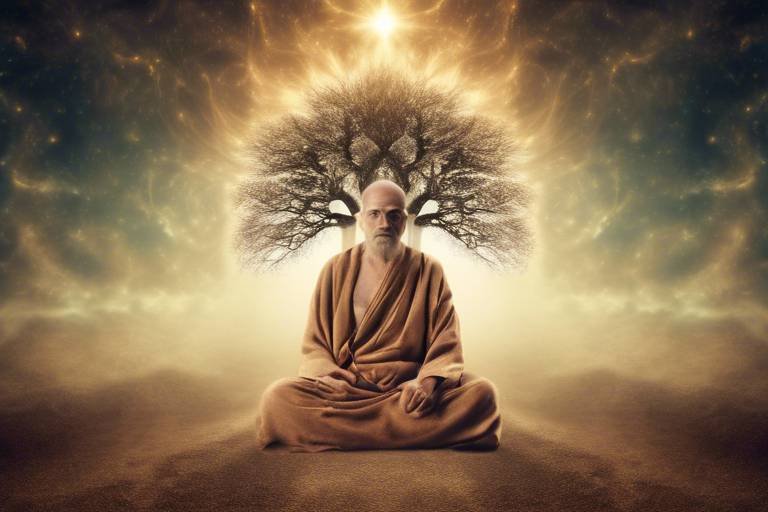The Concept of Consciousness in Different Religions
The concept of consciousness is a profound and intricate topic that has intrigued humanity for centuries. Across various cultures and religions, consciousness is perceived in unique ways, reflecting the diverse philosophical frameworks and spiritual beliefs that shape our understanding of existence. From the Hindu notion of Atman to the Buddhist concept of Anatta, and the Christian interpretation of the soul, each perspective offers a rich tapestry of ideas that invite us to explore the essence of awareness and our place in the universe.
In Hinduism, consciousness is deeply intertwined with the idea of the Atman, or the true self, which is ultimately connected to Brahman, the universal consciousness. This belief emphasizes the notion that our individual consciousness is not separate but rather a part of a greater whole. The teachings found in ancient texts like the Upanishads illuminate this relationship, urging followers to seek a deeper understanding of their own existence and the interconnectedness of all beings.
Buddhism, on the other hand, presents a contrasting view through the lens of Anatta, which translates to non-self. This principle asserts that the self is an illusion, and that clinging to this notion leads to suffering. Instead, Buddhists focus on the impermanence of thoughts and sensations, encouraging practitioners to cultivate a mindful awareness of their experiences. This approach not only fosters clarity but also paves the way for enlightenment, allowing individuals to transcend ordinary consciousness and realize their true nature.
Christianity contributes its own unique perspective on consciousness, viewing it primarily through the lens of the soul. The soul, according to Christian doctrine, is the essence of an individual that connects them to the divine. This belief shapes moral and ethical considerations, influencing how adherents perceive their actions and responsibilities. The journey of the soul is often seen as a path toward salvation, prompting followers to reflect on their consciousness and its alignment with divine will.
As we delve deeper into these religious interpretations, it becomes clear that consciousness is not merely a philosophical concept but a vital aspect of spiritual practice. Each tradition offers insights that can enrich our understanding of awareness, existence, and the nature of reality. By examining these diverse perspectives, we can appreciate the intricate ways in which consciousness shapes our beliefs, behaviors, and ultimately, our spiritual journeys.
- What is consciousness?
Consciousness refers to the state of being aware of and able to think about one's own existence, thoughts, and surroundings.
- How do different religions view consciousness?
Different religions interpret consciousness in various ways, often linking it to concepts such as the soul, self, or universal awareness.
- Why is consciousness important in spiritual practices?
Understanding consciousness is crucial in spiritual practices as it influences personal growth, ethical behavior, and the pursuit of enlightenment or divine connection.

[Consciousness in Hinduism]
Hinduism presents a multifaceted view of consciousness, intricately weaving together concepts of the self, the universe, and the divine. At the heart of this belief system lies the notion of the Atman, which is often described as the true self or soul of an individual. The Atman is not just a fragment of existence; it is a reflection of the greater reality known as Brahman, the universal consciousness that pervades everything. This relationship between Atman and Brahman is foundational in understanding how consciousness is perceived in Hindu philosophy.
Key texts such as the Upanishads and the Bhagavad Gita delve deeply into these concepts, illustrating the journey of the soul through various states of being and its ultimate quest for unity with Brahman. For instance, the Upanishads articulate that realizing the oneness of Atman and Brahman is essential for liberation (Moksha) from the cycle of birth and death (Samsara). This profound realization transforms one's consciousness, allowing individuals to see beyond the illusion of separateness and recognize their true nature.
Moreover, Hinduism emphasizes the significance of meditative practices and rituals that facilitate deeper awareness of consciousness. These practices are not merely spiritual exercises; they are pathways to understanding the layers of the mind and the essence of existence. For instance, through meditation, individuals can experience a heightened state of awareness, transcending the ordinary distractions of life and connecting with their Atman.
In addition to the philosophical texts, various schools of thought within Hinduism offer differing perspectives on consciousness. For example, the Advaita Vedanta school posits that the material world is an illusion (Maya), and true consciousness is realized through the understanding of non-duality. In contrast, the Vaishnavism tradition emphasizes a personal relationship with God, viewing consciousness as a means to connect with the divine through devotion (Bhakti).
To summarize, consciousness in Hinduism is a rich tapestry of ideas and beliefs that encapsulate the journey of the self towards ultimate realization. The interplay between Atman and Brahman, the importance of meditative practices, and the diverse philosophical interpretations all contribute to a holistic understanding of consciousness. As individuals explore these concepts, they embark on a transformative journey that not only enriches their spiritual lives but also enhances their understanding of existence itself.
In conclusion, the exploration of consciousness in Hinduism is not just an academic pursuit; it is a deeply personal journey that invites each individual to reflect on their own existence and connection to the universe. By contemplating these profound ideas, one may find inspiration and insight into their own consciousness and the larger mysteries of life.

[Buddhist Perspectives on Consciousness]
Buddhism offers a truly unique and profound interpretation of consciousness that diverges from many other religious perspectives. At the heart of Buddhist thought is the concept of Anatta, or non-self, which challenges the very notion of a permanent, unchanging identity. This idea asserts that what we perceive as 'self' is merely a collection of ever-changing physical and mental components. Imagine consciousness as a flowing river—constantly changing, never the same from one moment to the next. This fluidity is essential for understanding how Buddhists view the nature of existence and awareness.
In Buddhism, consciousness is not seen as a static entity but rather as a dynamic process that is deeply intertwined with the concepts of impermanence and suffering. The teachings suggest that our thoughts and feelings are transient, arising and passing away like clouds in the sky. This perspective encourages practitioners to cultivate a sense of awareness that allows them to observe these fluctuations without attachment. The realization that our thoughts are not who we are can lead to profound insights and a sense of liberation from the burdens of suffering.
Mindfulness, a cornerstone of Buddhist practice, plays a critical role in understanding consciousness. By being fully present in the moment, practitioners develop a heightened awareness of their thoughts, emotions, and sensations. This practice is akin to tuning in to a radio station: when you adjust the dial, you can hear the music clearly, free from static. Mindfulness helps individuals tune into their internal experiences, fostering clarity and peace.
Through mindfulness, Buddhists learn to observe their mental processes without judgment. This non-reactive awareness allows for a deeper understanding of how consciousness operates. For example, when a thought arises, instead of clinging to it or pushing it away, one simply acknowledges its presence and lets it drift away. This practice can significantly reduce stress and anxiety, leading to a more balanced and harmonious life.
Buddhism offers a variety of meditation techniques designed to cultivate awareness and insight into the nature of consciousness. Among the most popular are Vipassana and Zen meditation. Each method provides unique approaches to exploring the mind's workings:
| Meditation Technique | Focus | Benefits |
|---|---|---|
| Vipassana | Insight into the nature of reality | Increased self-awareness, emotional regulation |
| Zen Meditation | Present-moment awareness | Clarity of mind, reduced distractions |
Each technique encourages practitioners to observe their thoughts and feelings, promoting mental clarity and emotional well-being. By engaging in these practices, individuals can delve deeper into the workings of their consciousness, ultimately leading to greater self-understanding and enlightenment.
Nirvana represents the ultimate goal in Buddhism, a state of existence that transcends ordinary consciousness. It is not merely a place or a reward; rather, it signifies the cessation of suffering and the realization of one’s true nature. Think of it as the calm after a storm—the tumultuous waves of life settle, and a profound peace emerges. Achieving Nirvana means breaking free from the cycle of birth, death, and rebirth (samsara), allowing the individual to experience a state of pure awareness.
This profound state of consciousness is often described as the ultimate liberation, where desires, attachments, and ignorance dissolve. For many Buddhists, the journey towards Nirvana is both a spiritual and practical endeavor, requiring dedication to mindfulness, ethical living, and meditation practices. It serves as a guiding light, illuminating the path toward a more profound understanding of existence and consciousness itself.
When comparing Buddhist perspectives on consciousness with those from other religions, intriguing similarities and differences emerge. While Hinduism also emphasizes the transient nature of the self, it posits a more permanent essence (Atman) connected to the universal consciousness (Brahman). In contrast, Buddhism’s Anatta challenges the very existence of a permanent self, fostering a sense of liberation through the understanding of impermanence.
Ultimately, exploring these diverse interpretations enriches our understanding of spiritual awareness across cultures. By examining the various lenses through which consciousness is viewed, we can appreciate the depth and complexity of human experience.
- What is the main difference between Anatta and the concept of self in other religions? Anatta, or non-self, posits that there is no permanent self, while many other religions view the self as a constant essence.
- How does mindfulness practice change one's perception of consciousness? Mindfulness allows individuals to observe their thoughts and feelings without attachment, leading to a clearer understanding of their consciousness.
- What is the significance of Nirvana in Buddhism? Nirvana signifies the ultimate liberation from suffering and the cycle of rebirth, representing a state of pure awareness and peace.

[The Role of Mindfulness]
Mindfulness is not just a buzzword; it's a transformative practice that sits at the heart of Buddhism, acting as a bridge to deeper awareness and understanding of consciousness. Imagine your mind as a turbulent ocean, with waves of thoughts crashing against the shore. Mindfulness is like the calm lighthouse guiding you through the storm, helping you to navigate your mental landscape with clarity and purpose. By bringing your attention to the present moment, mindfulness allows you to observe your thoughts and feelings without judgment, creating a space for insight and growth.
At its core, mindfulness encourages us to be fully present in our experiences, whether they are mundane or profound. This practice can be likened to tuning a musical instrument; just as a musician must adjust the strings to achieve harmony, we too must fine-tune our awareness to find balance in our lives. When we practice mindfulness, we cultivate a heightened sense of awareness that enables us to notice the subtleties of our thoughts and emotions. This process is essential for understanding the nature of consciousness, as it reveals the transient quality of our mental states.
One of the most powerful aspects of mindfulness is its ability to foster a compassionate relationship with ourselves. Instead of getting swept away by the waves of anxiety or self-doubt, mindfulness invites us to step back and observe these feelings as temporary visitors. This shift in perspective can lead to profound changes in how we respond to life's challenges. By acknowledging our thoughts without getting entangled in them, we develop resilience and emotional intelligence.
Mindfulness can be integrated into various aspects of daily life, making it accessible to everyone. Here are some practical ways to incorporate mindfulness into your routine:
- Mindful Breathing: Take a few moments each day to focus on your breath. Inhale deeply, hold for a few seconds, and exhale slowly. This practice grounds you in the present.
- Body Scan: Lie down comfortably and mentally scan your body from head to toe, noticing any areas of tension or discomfort. This helps to foster body awareness.
- Mindful Eating: Savor each bite of your food, paying attention to the flavors, textures, and aromas. This practice enhances your relationship with nourishment.
The benefits of mindfulness extend beyond individual practice. In a communal setting, mindfulness can enhance relationships and foster a sense of connection. When we practice mindfulness together, we create a shared space of understanding and support. This collective awareness can lead to more compassionate interactions and a deeper appreciation for the shared human experience.
In summary, mindfulness is a vital tool for exploring consciousness. It empowers us to observe our thoughts and feelings, fostering a deeper understanding of ourselves and our place in the world. By embracing mindfulness, we can transcend the chaos of our minds, uncovering the profound insights that lie within. As we cultivate this practice, we not only enhance our own lives but also contribute to a more compassionate and aware society.
- What is mindfulness? Mindfulness is the practice of being fully present in the moment, observing thoughts and feelings without judgment.
- How can I practice mindfulness daily? You can practice mindfulness through mindful breathing, body scans, and mindful eating, among other techniques.
- What are the benefits of mindfulness? Mindfulness can reduce stress, enhance emotional intelligence, improve focus, and lead to a greater sense of well-being.

[Meditation Techniques]
Meditation is a profound practice in Buddhism that serves as a gateway to understanding consciousness. It's like peeling an onion; each layer reveals deeper insights into the self and the nature of reality. There are various meditation techniques, each designed to cultivate awareness and foster a clearer understanding of our thoughts and emotions. Let's dive into some of the most impactful methods!
One of the most popular techniques is Vipassana meditation, which translates to "clear seeing." This method focuses on observing thoughts and sensations without attachment. Practitioners sit in silence, often for extended periods, and pay close attention to their breath and bodily sensations. This practice helps individuals recognize the transient nature of thoughts, leading to a profound understanding of the impermanence of all things. Imagine standing by a flowing river, watching leaves float by; this is akin to how one learns to observe thoughts in Vipassana.
Another essential technique is Metta Bhavana, or loving-kindness meditation. In this practice, individuals cultivate feelings of love and compassion, first for themselves and then for others. By repeating phrases such as "May I be happy, may I be healthy," practitioners gradually expand their circle of compassion, encompassing friends, family, and even those they find challenging. This technique not only enhances emotional well-being but also fosters a sense of interconnectedness with all beings, much like the roots of a tree intertwining underground.
Additionally, Zazen, or seated meditation, is a cornerstone of Zen Buddhism. This technique emphasizes posture and breath, encouraging practitioners to sit with a straight back and focus on their breathing. The simplicity of Zazen allows for a deep exploration of consciousness, as it encourages letting go of distractions and tuning into the present moment. The stillness of Zazen can be likened to a calm lake, reflecting the clarity of one's thoughts.
To give you a clearer picture of these techniques, here’s a simple comparison table:
| Technique | Focus | Benefits |
|---|---|---|
| Vipassana | Observation of thoughts | Clear understanding of impermanence |
| Metta Bhavana | Cultivating loving-kindness | Enhanced compassion and emotional well-being |
| Zazen | Posture and breath | Deep exploration of consciousness |
Ultimately, the effectiveness of these meditation techniques lies in their ability to foster a deeper connection with our consciousness. By engaging in regular practice, individuals can cultivate a state of clarity and peace, akin to finding a quiet sanctuary amidst the chaos of everyday life. Each technique offers a unique pathway to understanding the mind, and as practitioners explore these methods, they may find themselves on a transformative journey toward enlightenment.
- What is the best meditation technique for beginners?
Starting with mindfulness meditation can be beneficial for beginners. It encourages awareness of the present moment and is easy to practice.
- How long should I meditate each day?
Even a few minutes of meditation daily can make a difference. As you become more comfortable, you can gradually increase the duration.
- Can meditation help with stress and anxiety?
Absolutely! Many studies show that meditation can significantly reduce stress and anxiety levels, promoting overall mental well-being.

[The Concept of Nirvana]
Nirvana is one of the most profound and often misunderstood concepts in Buddhism. It represents the ultimate goal of the Buddhist path, a state that transcends ordinary consciousness and the cycle of suffering known as samsara. To put it simply, if life is like a turbulent ocean filled with waves of desire, attachment, and suffering, then Nirvana is the calm and serene shore where one can finally rest. But what does this really mean?
In essence, Nirvana is not a place, but a state of being. It signifies the cessation of suffering and the end of the cycle of rebirth. When one achieves Nirvana, they experience a profound sense of peace and liberation from the chains of craving and ignorance. This liberation is often described as the extinguishing of a flame, where the heat of desire and the smoke of delusion dissipate, leaving behind a clear, tranquil mind.
To better understand Nirvana, it's crucial to explore its implications and how it relates to the broader Buddhist philosophy. Here are some key aspects:
- Non-Attachment: Achieving Nirvana requires letting go of attachments, whether they are to material possessions, relationships, or even personal identity. This non-attachment is not about renouncing life but about embracing it without the burdens of desire.
- Realization of True Nature: Nirvana allows individuals to realize their true nature, which is often obscured by layers of ignorance and delusion. This realization leads to a profound understanding of the interconnectedness of all beings.
- Freedom from the Cycle of Rebirth: According to Buddhist teachings, attaining Nirvana means breaking free from the endless cycle of birth, death, and rebirth. This liberation is often viewed as the ultimate form of enlightenment.
It's important to note that Nirvana is often described in negative terms, such as the absence of suffering or desire. This is not to suggest that it is a void or nothingness; rather, it signifies a state of pure awareness and contentment. Think of it like a clear sky after a storm—while the storm may have been tumultuous, the clarity that follows is refreshing and revitalizing.
In conclusion, the concept of Nirvana in Buddhism serves as a guiding light for practitioners seeking liberation from suffering. It invites individuals to embark on a transformative journey towards self-discovery and ultimate peace. As one progresses on this path, they may find that the journey itself—marked by mindfulness, ethical living, and deep meditation—is just as significant as the destination.

[Comparative Analysis with Other Religions]
When we dive into the rich tapestry of global religions, it becomes evident that the concept of consciousness is not a monolithic idea but rather a kaleidoscope of interpretations that vary significantly across cultures. For instance, while Hinduism emphasizes the connection between the Atman (the individual self) and Brahman (the universal consciousness), Buddhism takes a contrasting stance with its principle of Anatta, or non-self. This divergence raises intriguing questions about the nature of existence and personal identity. Are we merely a collection of transient thoughts and experiences, or do we possess a deeper essence that transcends our physical form?
In Christianity, the focus shifts to the soul as the seat of consciousness, which is believed to have a divine connection. This belief shapes moral and ethical frameworks, suggesting that our consciousness is not just a product of our thoughts and experiences but also a reflection of our relationship with the divine. This raises another compelling question: How does our understanding of consciousness influence our behavior and choices in life?
To further illustrate these differences, let's consider a comparative table that highlights key aspects of consciousness in these three religions:
| Aspect | Hinduism | Buddhism | Christianity |
|---|---|---|---|
| Nature of Self | Atman as eternal self | Anatta (no-self) | Soul as eternal entity |
| Ultimate Goal | Moksha (liberation) | Nirvana (cessation of suffering) | Salvation and eternal life |
| View on Reality | Unity with Brahman | Impermanence of all things | Creation by God |
| Role of Mindfulness | Self-realization through meditation | Mindfulness as a path to enlightenment | Prayer and reflection |
This table encapsulates the essence of how different religions interpret consciousness and its implications for human existence. For instance, while Hinduism and Christianity see consciousness as an integral part of a higher reality, Buddhism challenges the very notion of a permanent self, inviting practitioners to explore the fluidity of thoughts and emotions. This comparative analysis not only enriches our understanding of spiritual awareness but also underscores the profound questions that arise when we contemplate our existence.
Ultimately, the exploration of consciousness across these religious frameworks reveals both the diversity and the commonality in human thought regarding existence. Each perspective offers unique insights that can lead to a deeper understanding of ourselves and our place in the universe. By engaging with these different beliefs, we can cultivate a more holistic view of consciousness that embraces the complexity of our shared human experience.
- What is the main difference between the Hindu and Buddhist views on consciousness?
The main difference lies in the concept of self. Hinduism emphasizes the Atman as the true self, while Buddhism teaches Anatta, or non-self, suggesting that the self is an illusion.
- How does Christianity interpret consciousness?
Christianity views consciousness through the lens of the soul, which is believed to have a divine connection and plays a crucial role in moral and ethical decision-making.
- Why is mindfulness important in Buddhism?
Mindfulness is central to Buddhist practice as it promotes awareness of thoughts and sensations, helping individuals achieve clarity and peace, ultimately leading to enlightenment.

[Christian Views on Consciousness]
Christianity offers a profound exploration of consciousness, primarily through the lens of the soul and its relationship with the divine. In Christian theology, consciousness is often viewed as a reflection of the soul's connection to God, which shapes our understanding of morality, identity, and the essence of human existence. This perspective leads to intriguing discussions about the nature of awareness and how it influences our actions and decisions in life. The soul, in many Christian denominations, is considered the core of our being, a divine spark that distinguishes us from the rest of creation.
The significance of consciousness in Christianity is intertwined with the belief in free will. This concept posits that individuals have the ability to make choices that reflect their moral values and ethical beliefs. As such, consciousness is not merely a passive state of awareness; it is an active force that drives us to make decisions that align with our understanding of good and evil. This notion raises essential questions: If we are conscious beings with free will, how do our choices shape our spiritual journey? And what does it mean for our relationship with God?
Different Christian denominations interpret the soul's journey and its implications for personal identity in varied ways. For instance, Catholics believe in the immortality of the soul and the importance of sacraments in guiding it towards salvation. In contrast, some Protestant denominations emphasize a more personal relationship with God, focusing on faith and grace as the means to eternal life. This diversity in interpretation leads to a rich tapestry of beliefs regarding consciousness and the afterlife.
To illustrate these perspectives, consider the following table that summarizes key beliefs across different Christian denominations regarding consciousness and the soul:
| Denomination | View on the Soul | Consciousness and Free Will |
|---|---|---|
| Catholicism | Immortal soul, sacraments guide to salvation | Free will is essential for moral responsibility |
| Protestantism | Personal relationship with God, faith leads to salvation | Emphasizes grace and individual choice |
| Orthodox Christianity | Transcendental view of the soul, focus on theosis | Free will is integral to spiritual growth |
This table highlights that while there are common threads in understanding consciousness across Christianity, the nuances in beliefs reflect a broader theological discourse. The relationship between consciousness and moral responsibility is particularly significant. Many Christians believe that our conscious choices have eternal consequences, influencing not only our lives on Earth but also our fate in the afterlife. This belief instills a sense of purpose and accountability in individuals, prompting them to reflect on their actions and their alignment with divine teachings.
In conclusion, Christian views on consciousness intertwine the concepts of the soul, free will, and moral responsibility. This complex interplay invites individuals to explore their beliefs and the implications of their conscious choices. As we navigate our spiritual journeys, the questions of who we are and how we relate to the divine remain central to our understanding of consciousness within the Christian framework.
- What is the role of the soul in Christianity? The soul is considered the essence of a person, reflecting their identity and connection to God.
- How do different denominations view consciousness? Views vary, with some emphasizing the importance of sacraments and others focusing on personal faith and grace.
- What is the significance of free will in Christian consciousness? Free will is seen as essential for moral responsibility, allowing individuals to choose between good and evil.
- How does consciousness relate to the afterlife in Christianity? Many Christians believe that conscious choices influence one's eternal destiny, shaping their journey after death.

[The Soul and Its Journey]
The concept of the soul is a cornerstone of Christian theology, shaping not only beliefs about consciousness but also our understanding of existence itself. In Christianity, the soul is often viewed as the eternal essence of a person, a divine spark that connects humanity to God. This understanding raises profound questions about the nature of consciousness and the journey that the soul undertakes throughout its life and beyond. Many Christians believe that the soul is immortal, embarking on a journey that begins at birth and continues after physical death, ultimately leading to a divine reunion with God.
Different denominations interpret the journey of the soul in various ways, reflecting a rich tapestry of beliefs. For instance, some traditions emphasize the idea of salvation, where the soul's journey is marked by a struggle against sin and a quest for redemption. Others focus on the transformative power of grace, suggesting that the journey is less about individual effort and more about divine intervention. This spectrum of beliefs invites us to consider how our actions and choices impact the trajectory of our souls. Are we merely passive recipients of grace, or do we play an active role in shaping our destinies?
One common thread across many Christian teachings is the idea of an afterlife, where the soul is judged based on its earthly actions. This belief can be both comforting and daunting. For many, the thought of standing before God to account for their lives instills a sense of moral responsibility. The journey of the soul is not just about personal experiences but also about the impact one has on others and the world. The potential for eternal reward or punishment can motivate believers to lead lives aligned with Christian values.
To further illustrate the journey of the soul, consider the following stages that many Christians believe the soul undergoes:
- Creation: The soul is created by God and infused into the body at conception.
- Life on Earth: The soul experiences life, facing challenges, temptations, and opportunities for growth.
- Death: The separation of the soul from the body, leading to its judgment.
- Afterlife: The soul experiences either eternal communion with God in Heaven or separation from Him in Hell.
This journey is often depicted in various forms of Christian art and literature, symbolizing the soul's quest for truth and fulfillment. The parable of the Prodigal Son, for example, illustrates themes of repentance and redemption, emphasizing that no matter how far one strays, the journey back to God is always possible. Such narratives not only inspire believers but also provide a framework for understanding the complexities of human existence and the nature of consciousness.
In conclusion, the journey of the soul in Christianity is a profound exploration of consciousness intertwined with divine purpose. It challenges individuals to reflect on their lives, choices, and the spiritual legacy they wish to leave behind. By understanding this journey, believers can find meaning and direction, navigating the complexities of life with the hope of a brighter eternity.
- What is the soul according to Christianity? The soul is considered the eternal essence of a person, connecting them to God and surviving beyond physical death.
- Do all Christians believe in an afterlife? While most Christians believe in some form of afterlife, interpretations vary among denominations regarding its nature and conditions.
- How does the journey of the soul influence moral behavior? The belief in a soul's journey and eventual judgment encourages individuals to act ethically and responsibly during their lives.
- Can the soul change or evolve? Many Christians believe that the soul can grow through experiences and choices made during life, impacting its journey towards God.

[Consciousness and Free Will]
When we dive into the relationship between consciousness and free will in Christianity, we are stepping into a fascinating realm of theology and philosophy. At its core, the concept of free will suggests that individuals possess the ability to make choices that are not predetermined. This notion is profoundly intertwined with the idea of consciousness, as it implies a level of awareness and deliberation in decision-making. But how does this interplay manifest in the Christian worldview?
In Christianity, the belief in free will is often seen as a gift from God, allowing humans to choose between good and evil. This perspective emphasizes that we are not mere puppets acting out a divine script; instead, we are active participants in our own lives. This autonomy is what makes us morally accountable for our actions. As the saying goes, "With great power comes great responsibility." This means that our conscious choices can lead to spiritual growth or, conversely, to moral failure.
Moreover, different denominations interpret the relationship between consciousness and free will in varied ways. For instance, some traditions uphold the idea of total free will, where individuals can choose their path without any divine intervention. Others, however, may argue that God's grace influences our decisions, suggesting a more complex interaction between divine providence and human agency. This leads to intriguing questions:
- Is our consciousness a reflection of divine influence, or is it entirely our own?
- How do our conscious choices align with God's plan for us?
- What role does sin play in our ability to exercise free will?
To illustrate this relationship further, consider the following table that summarizes various Christian perspectives on free will:
| Denomination | View on Free Will | Implications for Consciousness |
|---|---|---|
| Roman Catholicism | Free will exists but is influenced by grace. | Conscious choices are guided by divine grace. |
| Protestantism | Emphasizes individual free will and personal relationship with God. | Consciousness is central to personal faith and moral choices. |
| Calvinism | Predestination limits free will; God’s will prevails. | Consciousness is shaped by God’s predetermined plan. |
Ultimately, the exploration of consciousness and free will in Christianity invites us to ponder profound questions about our existence. Are we truly free in our choices, or are we guided by forces beyond our understanding? This inquiry not only enriches our spiritual journey but also enhances our understanding of what it means to be human. As we navigate through life, our conscious decisions shape our identity, reflect our beliefs, and ultimately guide us toward our spiritual destiny.
- What is the significance of free will in Christianity? Free will is crucial as it allows individuals to choose their paths, making them morally accountable for their actions.
- How does consciousness relate to moral responsibility? Consciousness enables individuals to be aware of their choices, which is essential for moral responsibility and ethical behavior.
- Do all Christian denominations agree on the concept of free will? No, interpretations vary significantly among denominations, with some emphasizing total free will and others suggesting divine influence.
Frequently Asked Questions
- What is consciousness according to Hinduism?
In Hinduism, consciousness is viewed as the Atman, which represents the true self. It is believed to be connected to Brahman, the universal consciousness, emphasizing the idea that individual souls are part of a greater whole.
- How does Buddhism define consciousness?
Buddhism interprets consciousness through the lens of Anatta, or non-self, and the impermanence of thoughts. This perspective leads to a unique understanding of awareness, focusing on the transient nature of existence.
- What role does mindfulness play in understanding consciousness?
Mindfulness is essential in Buddhism as it promotes awareness of thoughts and sensations. By practicing mindfulness, individuals can gain deeper insights into their consciousness, leading to clarity and peace.
- What are some meditation techniques used in Buddhism?
Buddhism employs various meditation techniques aimed at cultivating awareness and insight. These practices help enhance mental clarity and emotional well-being, allowing practitioners to explore the nature of consciousness.
- What is Nirvana in relation to consciousness?
Nirvana represents the ultimate goal in Buddhism, signifying a state that transcends ordinary consciousness. It is associated with the cessation of suffering and the realization of one’s true nature.
- How do Christian views on consciousness differ from those in Hinduism and Buddhism?
Christianity addresses consciousness through the concept of the soul and its divine connection, which differs from the Hindu and Buddhist views that focus more on self and awareness. This theological perspective shapes moral and ethical considerations in human behavior.
- What is the significance of the soul in Christianity?
The soul in Christianity is central to beliefs about consciousness and the afterlife. Different denominations interpret the soul's journey in various ways, influencing personal identity and moral responsibility.
- How does free will relate to consciousness in Christian teachings?
Christian teachings often emphasize free will as a crucial component of consciousness. This relationship highlights the moral responsibility individuals have in making choices and the implications these choices carry for their spiritual journey.



















